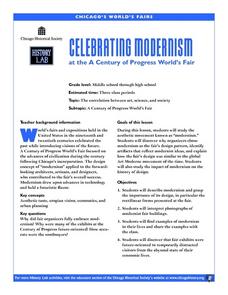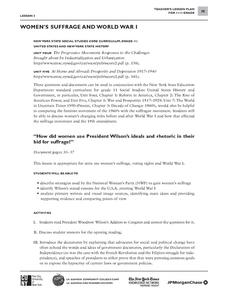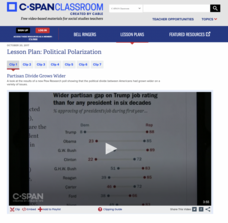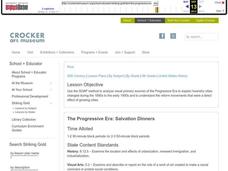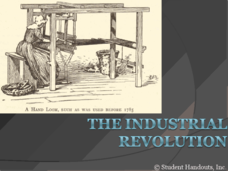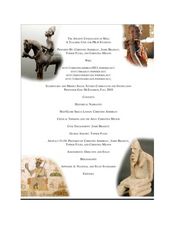Pulitzer Center
China's Rising Labor Movement
Young historians will explore the complex causes and effects of industrialization in China by perusing the numerous articles included in this webpage. Throughout the resource, there are many writing and discussion prompts to help direct...
Curated OER
Celebrating Modernism at the A Century of Progress World's Fair
Students examine aesthetic movement known as modernism, discover why organizers chose modernism as World Fair's design pattern, interpret photographs of modernist fair buildings and identify artifacts that reflect modernist ideas, and...
Alabama Department of Archives and History
Cells for Sale - Convict Leasing in Alabama
The benefits and drawbacks of convict leasing following the Civil War are the focus of a lesson that asks groups to examine primary source materials to gain an understanding of the program before individuals decide whether they are in...
City University of New York
Woman's Suffrage and World War I
How did women use President Wilson's ideals and rhetoric in their bid for suffrage? To answer this essential question, class groups analyze primary written documents and visual images.
National Endowment for the Humanities
Revolution '67, Lesson 2: What Happened in July 1967? How Do We Know?
Even in a world in which dozens of participants and curious onlookers record every controversial event, the basic facts of what happened are often in dispute. Revolution '67, Lesson 2 explores 1967 Newark, New Jersey using an examination...
Orange County Water Atlas
Location, Location, Location…
Young geographers discover not only how to read and recognize coordinates on a map, but also gain a deeper understanding of latitude and longitude and how climate changes can vary significantly across latitudes.
C-SPAN
Political Polarization
Dive into the political breach with pupils and explore the reasons for political polarization. Using clips from C-SPAN that include discussions from reporters and scholars, class members consider what is causing the political fault lines...
Curated OER
Exploring our National Parks
Students utilize maps/Atlases to find key spatial information, locate U.S. National Parks, characterize the geography of a specific region, and create a National Park brochure.
Curated OER
Module 13-Electronic Tax Return Preparation and Transmission
Students explain the electronic preparation and transmission of tax returns. They describe the ways to prepare and transmit tax returns and explain the benefits of electronic tax return preparation and transmission.
Curated OER
Journey to America
Fifth graders carefully analyze the artwork, Les Emigrants, and explore the reasons that people emigrated to the United States, and what life was like for new arrivals. They discuss what things immigrants were able to bring with them and...
Curated OER
The Progressive Era
Eighth graders utilize the SOAP method to analyze a work of art and relate it to what they know about the Progressive Era and the reasons why cities changed and the ways in which cities changed during the end of the 19th century. They...
Curated OER
The Impact of Cultural Values in EArly Industrial England
Tenth graders analyze works from the period of the Industrial Revolution in England and identify the cultural values depicted and inferred that paved the way for the Industrial Revolution to occur at this time. They create captions that...
Curated OER
The Art and Culture of the Afro-American
Your high schoolers will examine the community in which they live and discuss with the class. Using the Internet, they identify the importance of African-American art and how it relates to the African-American culture. Individually, they...
Curated OER
Ragtime: 1880-1920
Build an understanding of the social, economic, and cultural changes that were incited by the American Industrial Revolution. Learners will research the historical context of the Ragtime Era, and compose an oral presentation in the voice...
Curated OER
Photography and the National Park Service
During the 1800s the United States was expanding westward; land was there for the taking. Kids explore how some early photographers used their photography to influenced the US Congress to save areas like Mirror Lake. They complete a...
Curated OER
The Industrial Revolution
Contrasting between the "Haves" and the "Have-Nots" of 18th-19th century Europe, this presentation explores the social and technological implications of the Industrial Revolution. Inventions, social trends, and scientific breakthroughs...
Curated OER
The Indian Subcontinent Since 1947: The Legacy of Independence
An exploration of Indian and Pakistani cultures and conflicts throughout the 20th - 21st centuries, this presentation features relevant political cartoons and poignant photos to illustrate the breadth of politics in India and Pakistan....
Curated OER
The Ancient Civilization of Mali
Students explore the ancient civilization of Mali and examine various historical and cultural aspects of the civilization. In this ancient civilization of Mali lesson, students examine trade with respect to geographic locations, discover...
Historical Thinking Matters
Scopes Trial: 1 Day Lesson
Why did many Tennesseeans support the 1925 Butler Act, which forbade the teaching of evolution? Using several primary source documents and a brief video clip, your young historians will draw connections between the broader historical...
Polk Bros Foundation
I Can Draw Conclusions: History Analysis
This worksheet outlines the very basic first steps to analyzing a historical topic and determining its significance. The resource prompts learners to identify important persons in history, list major events, and evaluate cause and effect.
Federal Reserve Bank
FRED in the Classroom: Measures of Inflation
Don't just tell class members about how to measure inflation, have them experience it firsthand by asking them to work with real data and construct graphs!
Devine Educational Consultancy Services
Geography Student Workbook, Australia
Your youngsters will be experts on the geography of Australia after working with these activities and worksheets, which review the continent's weather, major landforms, dimensions, history, and climate.
NIOS Download
The Harappan Civilization
The Harappan Civilization, also known as the Indus Valley civilization (2600 BC-1900 BC), is the focus of a resource packet that details the rise and fall of a culture that existed in India during the Chalcolithic period of history.
University of Wisconsin
Why Did the Triangle Fire Occur?
An investigation of the 1911 New York City Triangle Shirtwaist Factory fire leads class members to examine primary and secondary source materials related to the event and apply what they learn about the working conditions at the time to...
Other popular searches
- Urban Studies Virginia
- Urban Studies in Africa
- Urban Studies Textbook
- Urban Studies Ireland
- Social Studies Urban Studies
- Urban Studies Math
- Esl Social Studies Urban
- Urban Studies New York
- 2nd Grade Urban Studies
- Social Studies Rural Urban



